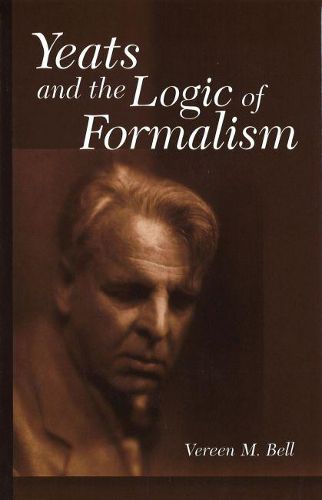Readings Newsletter
Become a Readings Member to make your shopping experience even easier.
Sign in or sign up for free!
You’re not far away from qualifying for FREE standard shipping within Australia
You’ve qualified for FREE standard shipping within Australia
The cart is loading…






Yeats and the Logic of Formalism deals with formalism as a philosophy in Yeats’s works and how that in turn affects both his art and his politics. Vereen M. Bell’s understanding of
formalism
and
philosophy
stems from a meditation by Yeats in a manuscript note:
Sometimes I doubt life’s values behind my own thought. They should have been there before the stream began, before it became necessary for the work to create them.
In Bell’s reading, formalism is not simply a philosophy of art but a philosophy of life as directed by art - an existential one at its source. While Bell understands that formalism is not a paradigm-shifting topic in today’s theoretical debates, he does attempt to reconsider the concept’s credibility in the context of other competing theoretical discourses. Bell invokes and elaborates upon Edward Said’s reading of Yeats as a special kind of colonial subject. He revisits the issue of how much Yeats and Nietzsche have in common and tries to show, in the manner of J Hillis Miller, that the primordial is for Yeats what formalism ultimately sets itself against.
Yeats and the Logic of Formalism
mediates between older, more traditional readings of Yeats’s work and recent theoretical, often antagonistic readings in an effort to restore a balanced perspective. The author centers most of his discussion on the poetry itself to provide a total reading of Yeats’s work. Early in his career Yeats wrote:
Hope and Memory have one daughter and her name is Art.
Coded in the word Hope here - considering the cultural and historical circumstances under which Yeats worked - is what Bell believes is the meaning, existentially, of Yeats’s career.
$9.00 standard shipping within Australia
FREE standard shipping within Australia for orders over $100.00
Express & International shipping calculated at checkout
Yeats and the Logic of Formalism deals with formalism as a philosophy in Yeats’s works and how that in turn affects both his art and his politics. Vereen M. Bell’s understanding of
formalism
and
philosophy
stems from a meditation by Yeats in a manuscript note:
Sometimes I doubt life’s values behind my own thought. They should have been there before the stream began, before it became necessary for the work to create them.
In Bell’s reading, formalism is not simply a philosophy of art but a philosophy of life as directed by art - an existential one at its source. While Bell understands that formalism is not a paradigm-shifting topic in today’s theoretical debates, he does attempt to reconsider the concept’s credibility in the context of other competing theoretical discourses. Bell invokes and elaborates upon Edward Said’s reading of Yeats as a special kind of colonial subject. He revisits the issue of how much Yeats and Nietzsche have in common and tries to show, in the manner of J Hillis Miller, that the primordial is for Yeats what formalism ultimately sets itself against.
Yeats and the Logic of Formalism
mediates between older, more traditional readings of Yeats’s work and recent theoretical, often antagonistic readings in an effort to restore a balanced perspective. The author centers most of his discussion on the poetry itself to provide a total reading of Yeats’s work. Early in his career Yeats wrote:
Hope and Memory have one daughter and her name is Art.
Coded in the word Hope here - considering the cultural and historical circumstances under which Yeats worked - is what Bell believes is the meaning, existentially, of Yeats’s career.